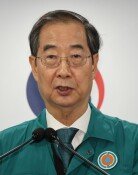[Opinion] Artistic Value as Literary Products
[Opinion] Artistic Value as Literary Products
Posted October. 28, 2006 07:06,
At the eastern end of a large field,/ a small stream is turning its corner while singing about an old story/ a brindled ox is relaxing and mooing in a golden sound around the time of sunset/ How I can forget the place even in my dream
This is the masterpiece of Korean Poet Jeong Ji-yong entitled Nostalgia. Singer Lee Dong-won made this poem into a song, and now the song is popular among the Korean people. This poem allows readers to recall their own old hometown in their childhood. Poet Jeong Ji-yong is a pioneer in trying to open a new chapter in the history of Korean modern poetry. It is believed that Koreas modern poetry started from him and his works.
In a day when the sky is so blue/ allow ourselves to miss somebody whom we always miss/ here is the place, where soon autumn flowers blossom/ where green leaves give way leaves tinged with red/ What should I do if snow falls../ What should I do if spring comes
The Green day by Seo Jeong-ju, whose penname was Midang, also brilliantly expresses a sweet-sorrow emotion of calmly waiting for someone. He is evaluated as a trailblazing poet, and his work is considered the kind that only the most gifted poet can possibly write. At the same time, each expression of the poem is so appealing and charming that he could also be titled as an alchemist of words.
Without mentioning Jeong Ji-yong and Seo Jeong-ju, Korean literary history cannot be discussed. Some people try to attach political or ideological meaning to their works and link such meaning to their artistic values. There was once a time when Jeong Ji-yongs works themselves were not judged on their own values because of the fact that Jeong decided to leave South Korea for North Korea during the Korean War.
On the contrary, these days, he is admired as poet who resisted Japanese colonial rule in the early 1990s. Meanwhile, Seo Jeong-ju is billed as a pro-Japanese poet during the same time and now condemned by some people. Poet Shin Gyeong-lim (71), who was once the president of The Association of Writers for National Literature (AWNL), sternly criticized this trend by saying, There is a wrong perception among the Korean people that the poets who left South Korea for North Korea were nationalistic, anti-Japanese campaigners while other poets, who decided to remain in South Korea, were pro-Japanese during Japanese colonial rule.
Novelist Hong Sang-wha was shocked at Cheonji Lake of Mt. Baekdu in last July when he participated in the South and North Korean writers meeting. At the meeting, a work by poet Kim Nam-ju, Our mother country is one, was recited. At the gunpoint of Yankee occupation force/ In front of snarling dogs, the capitalists Mr. Hong wrote in the article Distopia, published last year in the fall edition of Korean Literature, where I saw the real picture of the leftist ideology in South Korean society. He continued, It was very sad to realize that hatred is more passionate and more aggressive than justice. Well, I think even a layman can see whether there is any literary value in this very poem by poet Kim Nam-ju.
Yook Jeong-soo, Editorial Writer, sooya@donga.com







